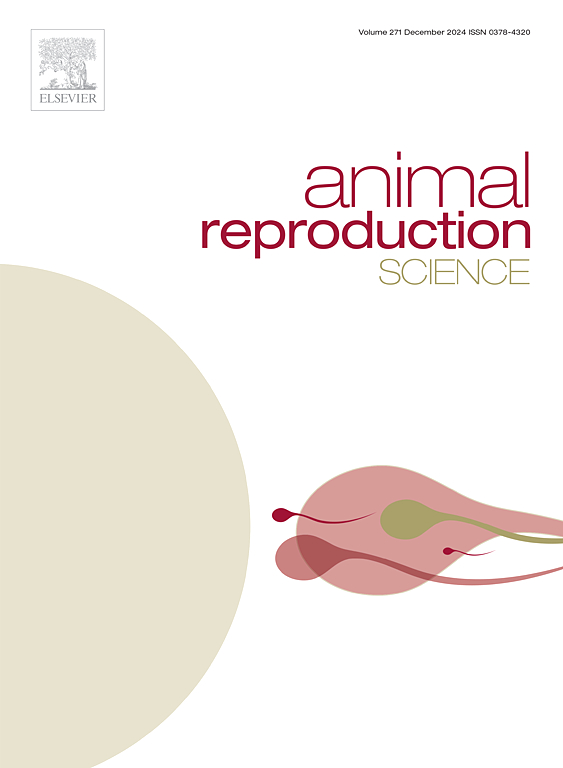通过基因组、转录组和表观基因组分析了解猪精液质量特征。过去、现在和未来的趋势。
IF 3.3
2区 农林科学
Q1 AGRICULTURE, DAIRY & ANIMAL SCIENCE
引用次数: 0
摘要
公猪繁殖性状(包括精液质量)对养猪生产系统可持续性的重要性日益得到学术界和工业界的认可。需要开展研究以了解这些性状背后的生物学和遗传成分,从而将其纳入选育计划和管理决策中。本文回顾了我们目前对基因组生物学以及基因组、转录组和表观基因组分析技术的理解,这些技术现在比以往任何时候都更便于识别影响表型的因果变异。我们对候选基因进行了基因组和转录组分析,并开展了全基因组关联研究、表达微阵列、编码和非编码基因的 RNA-Seq 以及表观基因组评估,以确定猪精子的分子组成。这些研究为若干精液相关参数提供了具有洞察力的信息。尽管如此,这项研究仍处于起步阶段。精子的转录组减少,表观基因组高度改变,因此被认为在核基因表达方面处于转录沉默状态。因此,精子的 RNA 和表观基因组在多大程度上再现了精子的生物学特性和功能尚不清楚。因此,我们预计,对睾丸和其他男性生殖器官进行单细胞水平分析,以揭示影响精子质量的细胞中活跃的转录和表观基因组图谱,将越来越受欢迎,并显著促进我们对精子相关特征的了解。未来的研究将更深入地探讨精子的生育能力、公猪对环境变化或恶劣条件的适应能力(尤其是在全球变暖的背景下),以及跨代遗传和环境如何影响精子转录组和表观基因组。本文章由计算机程序翻译,如有差异,请以英文原文为准。
Genomic, transcriptomic and epigenomic analysis towards the understanding of porcine semen quality traits. Past, current and future trends
The importance of boar reproductive traits, including semen quality, in the sustainability of pig production system is increasingly being acknowledged by academic and industrial sectors. Research is needed to understand the biology and genetic components underlying these traits so that they can be incorporated into selection schemes and managerial decisions. This article reviews our current understanding of genome biology and technologies for genome, transcriptome and epigenome analysis which now facilitate the identification of causal variants affecting phenotypes more than ever before. Genetic and transcriptomic analysis of candidate genes, Genome-Wide Association Studies, expression microarrays, RNA-Seq of coding and noncoding genes and epigenomic evaluations have been conducted to profile the molecular makeups of pig sperm. These studies have provided insightful information for a several semen-related parameters. Nonetheless, this research is still incipient. The spermatozoon harbors a reduced transcriptome and highly modified epigenome, and it is assumed to be transcriptionally silent for nuclear gene expression. For this reason, the extent to which the sperm’s RNA and epigenome recapitulate sperm biology and function is unclear. Hence, we anticipate that single-cell level analyses of the testicle and other male reproductive organs, which can reveal active transcription and epigenomic profiles in cells influencing sperm quality, will gain popularity and markedly advance our understanding of sperm-related traits. Future research will delve deeper into sperm fertility, boar resilience to environmental changes or harsh conditions, especially in the context of global warming, and also in transgenerational inheritance and how the environment influences the sperm transcriptome and epigenome.
求助全文
通过发布文献求助,成功后即可免费获取论文全文。
去求助
来源期刊

Animal Reproduction Science
农林科学-奶制品与动物科学
CiteScore
4.50
自引率
9.10%
发文量
136
审稿时长
54 days
期刊介绍:
Animal Reproduction Science publishes results from studies relating to reproduction and fertility in animals. This includes both fundamental research and applied studies, including management practices that increase our understanding of the biology and manipulation of reproduction. Manuscripts should go into depth in the mechanisms involved in the research reported, rather than a give a mere description of findings. The focus is on animals that are useful to humans including food- and fibre-producing; companion/recreational; captive; and endangered species including zoo animals, but excluding laboratory animals unless the results of the study provide new information that impacts the basic understanding of the biology or manipulation of reproduction.
The journal''s scope includes the study of reproductive physiology and endocrinology, reproductive cycles, natural and artificial control of reproduction, preservation and use of gametes and embryos, pregnancy and parturition, infertility and sterility, diagnostic and therapeutic techniques.
The Editorial Board of Animal Reproduction Science has decided not to publish papers in which there is an exclusive examination of the in vitro development of oocytes and embryos; however, there will be consideration of papers that include in vitro studies where the source of the oocytes and/or development of the embryos beyond the blastocyst stage is part of the experimental design.
 求助内容:
求助内容: 应助结果提醒方式:
应助结果提醒方式:


